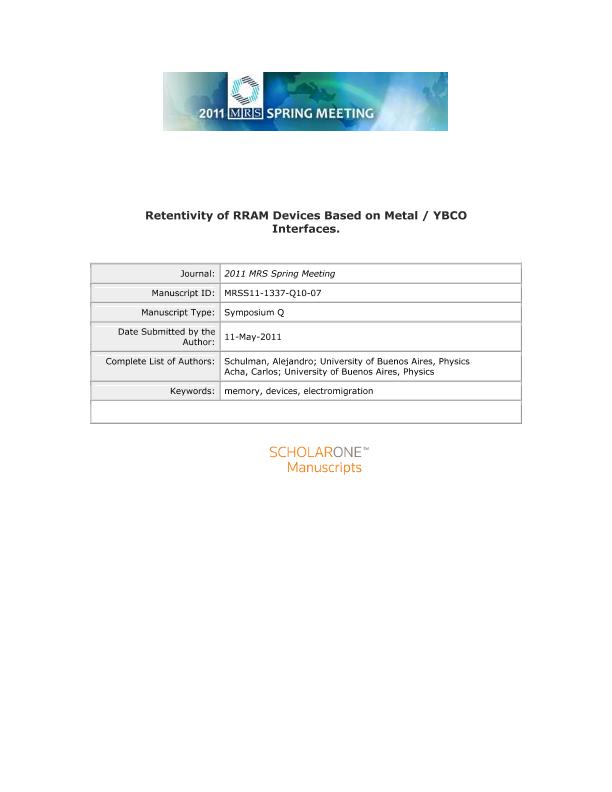Mostrar el registro sencillo del ítem
dc.contributor.author
Schulman, Alejandro Raúl

dc.contributor.author
Acha, Carlos Enrique

dc.date.available
2018-08-27T16:21:09Z
dc.date.issued
2011-05
dc.identifier.citation
Schulman, Alejandro Raúl; Acha, Carlos Enrique; Retentivity of RRAM devices based on metal/YBCO interfaces; Cambridge University Press; Mat. Res. Soc. Symp. Proc. (pittsburg); 1337; 5-2011; 103-107
dc.identifier.issn
0272-9172
dc.identifier.uri
http://hdl.handle.net/11336/57199
dc.description.abstract
The retention time of the resistive state is a key parameter that characterizes the possible utilization of the RRAM devices as a non - volatile memory device. The understanding of the mechanism of the time relaxation process of the information state may be essential to improve their performances. In this study we examine RRAM devices based on metal / YBCO interfaces in order to comprehend the physics beneath the resistive switching phenomenon. Our experimental results show that after producing the switching of the resistance from a low to a high state, or vice versa, the resistance evolves to its previous state in a small but noticeable percentage. We have measured long relaxation effects on the resistance state of devices composed by metal (Au, Pt) / ceramic YBCO interfaces in the temperature range 77 K - 300 K. This time relaxation can be described by a stretched exponential law that is characterized by a power exponent n = 0.5, which is temperature independent, and by a relaxation time τ that increases with increasing the temperature. These characteristics point out to a non-thermally assisted diffusion process that could be associated with oxygen (or vacancy) migration and that produces the growth of a conducting (or insulating) fractal structure. © 2011 Materials Research Society.
dc.format
application/pdf
dc.language.iso
eng
dc.publisher
Cambridge University Press
dc.rights
info:eu-repo/semantics/openAccess
dc.rights.uri
https://creativecommons.org/licenses/by-nc-sa/2.5/ar/
dc.subject
Memoria
dc.subject
Retentividad
dc.subject
Interfaz
dc.subject
Electrónica de Óxidos
dc.subject.classification
Astronomía

dc.subject.classification
Ciencias Físicas

dc.subject.classification
CIENCIAS NATURALES Y EXACTAS

dc.title
Retentivity of RRAM devices based on metal/YBCO interfaces
dc.type
info:eu-repo/semantics/article
dc.type
info:ar-repo/semantics/artículo
dc.type
info:eu-repo/semantics/publishedVersion
dc.date.updated
2018-08-23T19:06:24Z
dc.journal.volume
1337
dc.journal.pagination
103-107
dc.journal.pais
Reino Unido

dc.journal.ciudad
Cambridge
dc.description.fil
Fil: Schulman, Alejandro Raúl. Universidad de Buenos Aires. Facultad de Ciencias Exactas y Naturales. Departamento de Física. Laboratorio de Física de Bajas Temperaturas; Argentina. Consejo Nacional de Investigaciones Científicas y Técnicas. Oficina de Coordinación Administrativa Ciudad Universitaria. Instituto de Física de Buenos Aires. Universidad de Buenos Aires. Facultad de Ciencias Exactas y Naturales. Instituto de Física de Buenos Aires; Argentina
dc.description.fil
Fil: Acha, Carlos Enrique. Universidad de Buenos Aires. Facultad de Ciencias Exactas y Naturales. Departamento de Física. Laboratorio de Física de Bajas Temperaturas; Argentina. Consejo Nacional de Investigaciones Científicas y Técnicas. Oficina de Coordinación Administrativa Ciudad Universitaria. Instituto de Física de Buenos Aires. Universidad de Buenos Aires. Facultad de Ciencias Exactas y Naturales. Instituto de Física de Buenos Aires; Argentina
dc.journal.title
Mat. Res. Soc. Symp. Proc. (pittsburg)

dc.relation.alternativeid
info:eu-repo/semantics/altIdentifier/url/http://journals.cambridge.org/action/displayAbstract?fromPage=online&aid=8319799
dc.relation.alternativeid
info:eu-repo/semantics/altIdentifier/doi/http://dx.doi.org/10.1557/opl.2011.987
Archivos asociados
